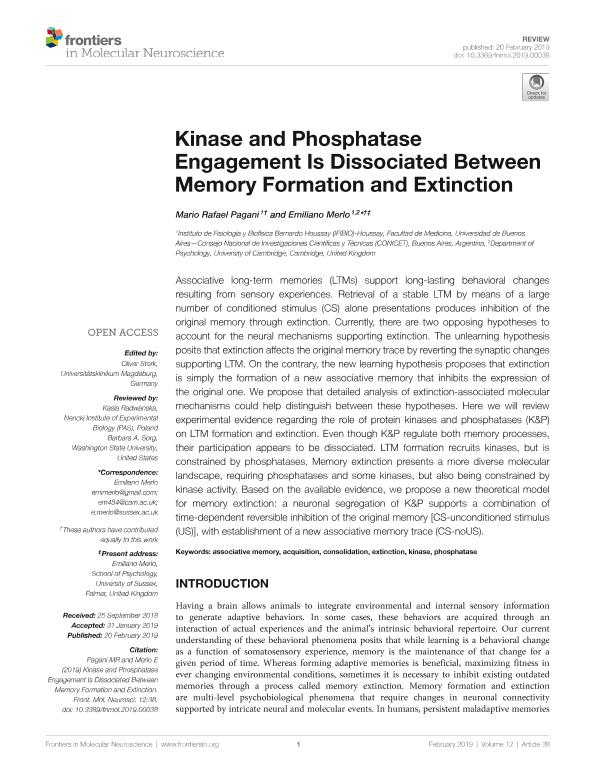Mostrar el registro sencillo del ítem
dc.contributor.author
Pagani, Mario Rafael

dc.contributor.author
Merlo, Emiliano

dc.date.available
2020-12-16T15:44:32Z
dc.date.issued
2019-02
dc.identifier.citation
Pagani, Mario Rafael; Merlo, Emiliano; Kinase and phosphatase engagement is dissociated between memory formation and extinction; Frontiers Media S.A.; Frontiers in Molecular Neuroscience; 12; 38; 2-2019; 1-16
dc.identifier.issn
1662-5099
dc.identifier.uri
http://hdl.handle.net/11336/120575
dc.description.abstract
Associative long-term memories (LTMs) support long-lasting behavioral changes resulting from sensory experiences. Retrieval of a stable LTM by means of a large number of conditioned stimulus (CS) alone presentations produces inhibition of the original memory through extinction. Currently, there are two opposing hypotheses to account for the neural mechanisms supporting extinction. The unlearning hypothesis posits that extinction affects the original memory trace by reverting the synaptic changes supporting LTM. On the contrary, the new learning hypothesis proposes that extinction is simply the formation of a new associative memory that inhibits the expression of the original one. We propose that detailed analysis of extinction-associated molecular mechanisms could help distinguish between these hypotheses. Here we will review experimental evidence regarding the role of protein kinases and phosphatases (K&P) on LTM formation and extinction. Even though K&P regulate both memory processes, their participation appears to be dissociated. LTM formation recruits kinases, but is constrained by phosphatases. Memory extinction presents a more diverse molecular landscape, requiring phosphatases and some kinases, but also being constrained by kinase activity. Based on the available evidence, we propose a new theoretical model for memory extinction: a neuronal segregation of K&P supports a combination of time-dependent reversible inhibition of the original memory [CS-unconditioned stimulus (US)], with establishment of a new associative memory trace (CS-noUS).
dc.format
application/pdf
dc.language.iso
eng
dc.publisher
Frontiers Media S.A.

dc.rights
info:eu-repo/semantics/openAccess
dc.rights.uri
https://creativecommons.org/licenses/by/2.5/ar/
dc.subject
ACQUISITION
dc.subject
ASSOCIATIVE MEMORY
dc.subject
CONSOLIDATION
dc.subject
EXTINCTION
dc.subject
KINASE
dc.subject
PHOSPHATASE
dc.subject.classification
Bioquímica y Biología Molecular

dc.subject.classification
Ciencias Biológicas

dc.subject.classification
CIENCIAS NATURALES Y EXACTAS

dc.title
Kinase and phosphatase engagement is dissociated between memory formation and extinction
dc.type
info:eu-repo/semantics/article
dc.type
info:ar-repo/semantics/artículo
dc.type
info:eu-repo/semantics/publishedVersion
dc.date.updated
2020-11-19T21:38:50Z
dc.journal.volume
12
dc.journal.number
38
dc.journal.pagination
1-16
dc.journal.pais
Suiza

dc.journal.ciudad
Lausanne
dc.description.fil
Fil: Pagani, Mario Rafael. Consejo Nacional de Investigaciones Científicas y Técnicas. Oficina de Coordinación Administrativa Houssay. Instituto de Fisiología y Biofísica Bernardo Houssay. Universidad de Buenos Aires. Facultad de Medicina. Instituto de Fisiología y Biofísica Bernardo Houssay; Argentina
dc.description.fil
Fil: Merlo, Emiliano. Consejo Nacional de Investigaciones Científicas y Técnicas. Oficina de Coordinación Administrativa Houssay. Instituto de Fisiología y Biofísica Bernardo Houssay. Universidad de Buenos Aires. Facultad de Medicina. Instituto de Fisiología y Biofísica Bernardo Houssay; Argentina. University of Cambridge; Estados Unidos
dc.journal.title
Frontiers in Molecular Neuroscience
dc.relation.alternativeid
info:eu-repo/semantics/altIdentifier/url/https://www.frontiersin.org/articles/10.3389/fnmol.2019.00038/full
dc.relation.alternativeid
info:eu-repo/semantics/altIdentifier/doi/http://dx.doi.org/10.3389/fnmol.2019.00038
Archivos asociados
